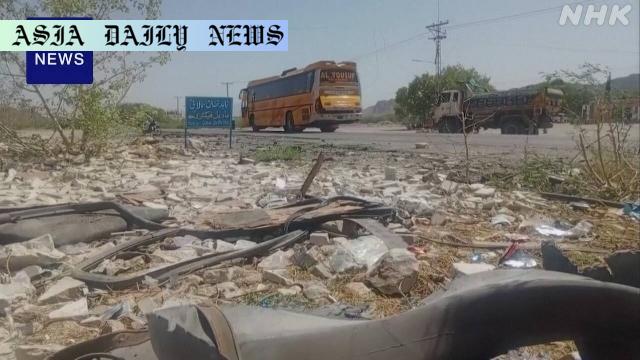Pakistan: A school bus blast in Balochistan province leaves 6 dead, including 4 children, in an attack linked to terrorist actions.

Tragic Explosion in Pakistan’s Balochistan Province
An explosion targeting a school bus in Pakistan’s southwestern Balochistan province has led to the deaths of six individuals, including four children. The bus was en route to a military-run school and carried over 40 children. The incident has shocked the nation and drawn responses from both local authorities and the country’s Prime Minister. Early investigations suggest that the attack was caused by an improvised explosive device (IED), a tactic often associated with terrorist groups in the region.
Prime Minister Sharif’s Strong Response
Prime Minister Shehbaz Sharif condemned the attack, labeling it a cowardly act carried out by terrorists. He accused India of sponsoring the perpetrators, a charge he did not substantiate with specific evidence. The Prime Minister vowed that all necessary efforts would be made to thwart what he referred to as “nefarious intentions” of these groups aiming to disrupt peace in Balochistan. His statement reflects the ongoing tensions between Pakistan and its neighbor India, a relationship marked by decades of conflict, particularly over the contested Kashmir region.
Rising Concerns Over Regional Stability
The school bus bombing comes at a time when both countries had recently agreed to a ceasefire following heightened tensions over Kashmir. Yet, incidents like these have the potential to escalate hostilities. Balochistan itself has long been a hotspot for militant violence, given its strategic location and ongoing separatist movements. The latest attack adds to a series of challenges for the region, affecting not just national security but also the local community, families, and children who now live in fear.
Escalating Indo-Pakistani Tensions
Pakistan’s allegations of Indian involvement in the attack have intensified the existing discord between the two nuclear-armed nations. These claims, if true, could further inflame the situation. Previous military clashes between the two nations, such as those stemming from the disputed Kashmir region, underline the persistent fragility in bilateral relations. Both nations have accused each other of supporting insurgencies and terrorist groups operating across their borders.
The Larger Implications of Violence in Balochistan
Balochistan, Pakistan’s largest province in terms of area, remains impoverished despite its rich natural resources. Separatist movements and extremist groups frequently exploit societal grievances to further their agendas. This attack highlights the vulnerability of children and communities in conflict zones, amplifying calls for comprehensive strategies to counter terrorism and protect civilians.
A Call for Regional Cooperation
Many experts argue that regional cooperation and dialogue are essential to addressing the root causes of such crises. While political accusations and heightened rhetoric draw attention, the prevailing humanitarian consequences demand a unified response. As global pressure mounts for peace, the need for confidence-building measures and conflict mediation between India and Pakistan becomes increasingly critical.
Commentary
Heartbreaking Loss of Innocent Lives
The recent blast targeting a school bus in Balochistan has left an indelible mark on the hearts of millions. The death of four innocent children, along with two other victims, serves as a grim reminder of the severe costs of lingering conflicts and terrorism. The incident is not just a tragedy for the families involved but a collective wound for the nation as a whole.
Political Accusations and Consequences
Prime Minister Shehbaz Sharif’s accusations of Indian sponsorship behind the attack have added another layer of complexity to an already strained relationship. Such claims, whether they hold merit or not, often exacerbate tensions, shifting focus away from addressing the root causes of violence. While the anger and outrage are understandable, such incidents also offer an opportunity for introspection and a chance to initiate peace-building efforts.
The Ripple Effect on Local Communities
For the families in Balochistan, life will never be the same again. Parents who sent their children to school expecting them to return safely are now grappling with unimaginable grief. This tragedy highlights the urgent need to protect vulnerable populations, especially children, from the devastating effects of conflict. Community safety measures and stronger security protocols should be prioritized to prevent such incidents in the future.
The Way Forward
While it is crucial to respond firmly to acts of terrorism, the solution lies in fostering dialogue and understanding rather than perpetuating cycles of blame. India and Pakistan, as neighbors with interconnected histories, need to explore avenues for peace and reconciliation. The global community must encourage both nations to prioritize the safety and well-being of their citizens over political rivalry. Only through cooperative efforts can such senseless violence be curbed.


